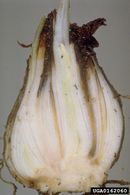Phytopathology (2014) 104, 306-312
From Pestinfo-Wiki
 | Selected publication you are invited to contribute to the discussion section (above tab) |
Exploitation of FTA cartridges for the sampling, long-term storage, and DNA-based analyses of plant-parasitic nematodes
Phytopathology 104 (3), 306-312
Abstract: The use of DNA-based analyses in molecular plant nematology research has dramatically increased over recent decades. Therefore, the development and adaptation of simple, robust, and cost-effective DNA purification procedures are required to address these contemporary challenges. The solid-phase-based approach developed by Flinders Technology Associates (FTA) has been shown to be a powerful technology for the preparation of DNA from different biological materials, including blood, saliva, plant tissues, and various human and plant microbial pathogens. In this work, we demonstrate, for the first time, that this FTA-based technology is a valuable, low-cost, and time-saving approach for the sampling, long-term archiving, and molecular analysis of plant-parasitic nematodes. Despite the complex structure and anatomical organization of the multicellular bodies of nematodes, we report the successful and reliable DNA-based analysis of nematode high-copy and low-copy genes using the FTA technology. This was achieved by applying nematodes to the FTA cards either in the form of a suspension of individuals, as intact or pestle-crushed nematodes, or by the direct mechanical printing of nematode-infested plant tissues. We further demonstrate that the FTA method is also suitable for the so-called "one-nematode-assay", in which the target DNA is typically analyzed from a single individual nematode. More surprisingly, a time-course experiment showed that nematode DNA can be detected specifically in the FTA-captured samples many years after initial sampling occurs. Collectively, our data clearly demonstrate the applicability and the robustness of this FTA-based approach for molecular research and diagnostics concerning phytonematodes; this research includes economically important species such as the stem nematode (Ditylenchus dipsaci), the sugar beet nematode (Heterodera schachtii), and the Northern root-knot nematode (Meloidogyne hapla).
(The abstract is excluded from the Creative Commons licence and has been copied with permission by the publisher.)
Link to article at publishers website
Database assignments for author(s): Martin Marek, Ondrej Douda
Research topic(s) for pests/diseases/weeds:
molecular biology - genes
surveys/sampling/distribution
Pest and/or beneficial records:
| Beneficial | Pest/Disease/Weed | Crop/Product | Country | Quarant. |
|---|---|---|---|---|
| Meloidogyne hapla | ||||
| Ditylenchus dipsaci |